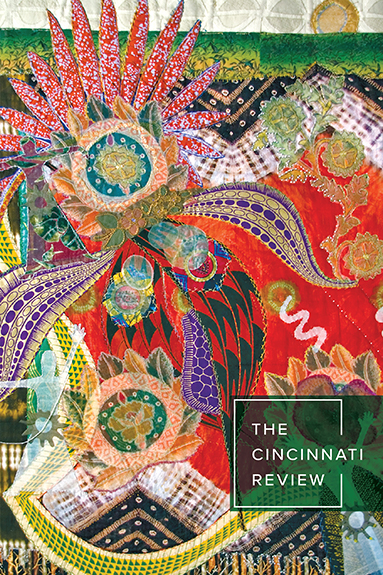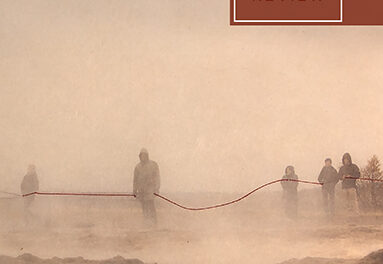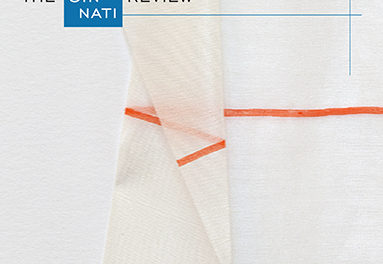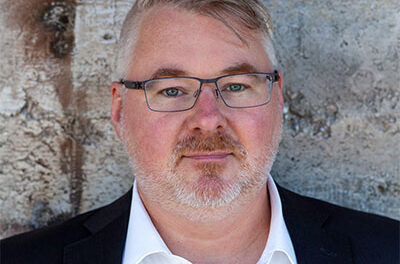I am seventeen and driving fast on a two-lane highway with the windows open. It’s late afternoon, that hour when the day’s edges are singed gold. I’m alone, and because I’ve just recently gotten my license, this aloneness is a thing of wonder. The light in the Long Island sky seems to be telling me something, promising me something. I press my foot to the pedal of my mother’s ancient Volvo station wagon, barreling headlong into this promise, into the golden wildness of it.
In a few weeks, I will leave home for college. Maybe it’s the closeness of this freedom I feel as I turn up the radio and sing along to Pearl Jam’s “Elderly Woman Behind the Counter in a Small Town,” banging my hand against the dashboard, knowing with certainty as I zoom past the Rite Aid and Joe’s Pizzeria that Eddie Vedder is singing to me—to me. His thrashing plaid-shirted body, the same one I’ve watched him hurl into a mosh pit dozens of times in the “Even Flow” video, is here in this car with me, but instead of falling into the arms of a concert crowd, it is falling into me. I can feel Eddie Vedder against my chest, Eddie Vedder on my skin, and I press my foot down harder on the gas, my heart the most powerful pumping thing in the world. I have shed all that I was just minutes ago: dutiful girl, rule-loving girl, girl with the anxious knee bouncing, with something inside that needs to get out.
I am heading to a party where anything could happen. I could drink a Smirnoff and orange juice, or I could not. I could let my hand brush against Nick Meyer’s hand as if by accident, or I could not. I could dance, or not dance, barefoot on the grass with my head tilted back and my arms stretched up to the moon. What I know is that I have endless days, months, years ahead to rub myself up against the moment, to grab the moment by the back of the neck and pull its forehead to mine, to press our mouths hard together.
The AC is broken, and the backs of my thighs stick to the car seat, which is hot and seamed with sand. I turn up the volume. I am nearly screaming now. I can feel the bass in my ribs and something spreading deep in my belly that’s like joy, but dangerous. Power? Desire? Maybe both. This is what it is to be seventeen years old, the whole night—and my whole life—ahead of me.
*
There is no precise moment when my whole life stops being ahead of me. This girl in the car believes she will never not be this young. And for a long time, she is nearly right.
In college, she is young, with her full round face and her late-night conversations she’s certain no one has had before and her pack of Marlboros a day because only old people die. She dances on tables, takes road trips to Montreal on a whim, flirts with her English professor, has sex on the Arts quad in the middle of the night. In her midtwenties, she is older, but barely. At night, she wears stilettos with dagger-sharp toes and jeggings that cling to her hips. And in the day, when she stands in front of a classroom of high school juniors teaching Othello, she feels she is playing make-believe, for she knows inside she is pretty much still one of them.
Meeting the man who would become her husband doesn’t age her, nor does marrying him. You should have seen her gown! In that period of the early aughts when all the brides wore satin A-lines, her dress is drapey and diaphanous, with a plunging open back that requires she go braless. This works because her breasts are young and pert and can hold their own.
Turning thirty barely registers. And while she knows on some level when she becomes pregnant and gives birth at thirty-three that she has reached a new life stage, it’s easy to believe she’s still more or less young. There’s so much newness in having a child, after all, so much abundance. She has another baby, and then another, which means she spends most of her thirties with her belly swelling or a baby at her breast, her body reminding her, over and over, that it’s luxuriant and fruitful.
Then one morning, after all her babies have left her womb, she walks from the train to work through downtown Boston. She feels fresh and brisk, her hair smelling of peach shampoo, the coffee in her hand filling her with certainty that the day is hers to conquer. She crosses Tremont Street and bounds onto the sidewalk, where she comes face-to-face with the glass facade of a building and the reflection of a woman she is startled to discover is her. Could this possibly be her mouth? On either side are two grooves she’s never noticed before, the skin around them slack and slightly drooping. She touches her fingers to her face to confirm. These eyes are her eyes, all right—they’re looking right at her—but the half moons below them are darker than she’s ever imagined possible. She walks on, eager to put distance between herself and this evidence that somehow, somehow, time has reached her. She knows, of course, that no one escapes time. But she sees, in this moment, that she has until now held a buried faith that maybe she could escape it—that her minutes might magically slip past her body unregistered.
She returns that evening to her three kids, a porch littered with strollers, a pile of school forms. In the kitchen cabinet is the bottle of Caltrate 600 her internist has prescribed to prevent osteoporosis. On her desk calendar is an appointment for a mammogram. On her head are so many gray hairs they can no longer pass as highlights. When she undresses for bed, she notices, most of all, the way her breasts lie flat against her rib cage.
There’s no graduation from youth, no clear before and after. Her whole life, she was not in the after, and by the time she realizes she is in the after, she is already squarely there.
*
One afternoon, my friend Michelle calls to tell me a story. The night before, she’d been walking to meet friends for dinner. An evening away from her kids is a rare treat for her—as it is for all my mother-friends—and she’d dressed for the occasion: lipstick, knee-high boots, and her favorite jacket, a creamy suede number with a faux-fur collar. As she crossed through the park, passing the basketball court, a boy who looked around fifteen suddenly appeared before her. “Excuse me,” he said. “Are you a MILF?”
“I was so caught off guard!” Michelle tells me. “Clearly, his friends had put him up to this.”
It’s been so many years since I’ve heard this term that it takes a second to register. MILF, I say to myself. MILF. And then, I think, MILF?! This acronym for “Mother I’d Like to Fuck” is exponentially more jarring to me now, as a mother, than it was in adolescence. My girlfriends and I didn’t use this term back then. It belonged to the boys, and they alone had the power to bestow it, or not bestow it, on our mothers. Lindsey Corvolo’s mom, with her endless legs and frosted blond highlights, was a MILF, as was Amy Pollack’s, who once famously danced with the DJ while chaperoning our eighth-grade mixer. My own mother was occasionally deemed a MILF—“in a Charlie’s Angel sort of way,” my friend Danny Farber once said.
Did it matter that Danny was fourteen and had never had sex with anyone, let alone a grown woman? No. The point wasn’t that such an encounter was possible. The point, for these boys on the cusp of manhood, was to claim the full breadth of their right to define the female body, to show that no woman fell outside the range of this right, even those thirty years their senior. The word fuck is key here. Have sex with wouldn’t do. The crudeness of fuck, with its hard consonants and their connotations of force, provides the necessary contrast with mother and all the virtue and tenderness that word implies, upending the common understanding that a mother—by dint of her age, her experience, her matronly status—is no longer an object to be desired.
“Wow. I haven’t heard that term in so long,” I say. “It’s such a sexist term, if you think about it.”
“I know!” says Michelle.
“And sort of disgusting.”
“Seriously.”
“What did you say back?”
“Nothing, really. I just sort of smirked and walked on.” We’re both quiet for a moment, and then she says. “I wonder what it was that made him single me out.” And then, “I did feel sort of sexy in that jacket.”
When we end our call, I scoop globs of Nutella onto three plates and herd my children into the kitchen for their snack. My daughter Leah comes to the table with her comic book and starts to read me a funny bit, but I can only half listen. What I’m thinking about is this: If it had been me walking through that park last night, would I have been called a MILF?
For the next few hours I am preoccupied by this question, until it becomes impossible to hide from myself that, while I categorically object to the term MILF, I very much want to be a MILF. For it is one thing to know something intellectually, and it’s an entirely different thing to know it in the part of you that makes you crane your neck to see yourself from behind in the mirror or spritz yourself with Victoria’s Secret Eau So Sexy body spray before leaving your house. I look down at my soft thighs in their faded leggings, the raised veins crossing the backs of my hands. I run my palm over the pleated skin of my stomach. I cannot assess what it is that I am.
That night, I turn to my husband, Paul, as we’re washing up for bed.
“Do you think I’m a MILF?” I ask.
“A MILF? Of course you’re a MILF.”
“Why do you say that?”
“Well, you’re a mother,” he says, as if this is the simplest, most obvious truth in the world, “and I want to fuck you.” He is being funny, but also dead serious. Standing beside my husband at our sink, I feel desired, loved, grateful anew that I have chosen this man to be my life partner. But I do not feel my question has been answered.
. . .










